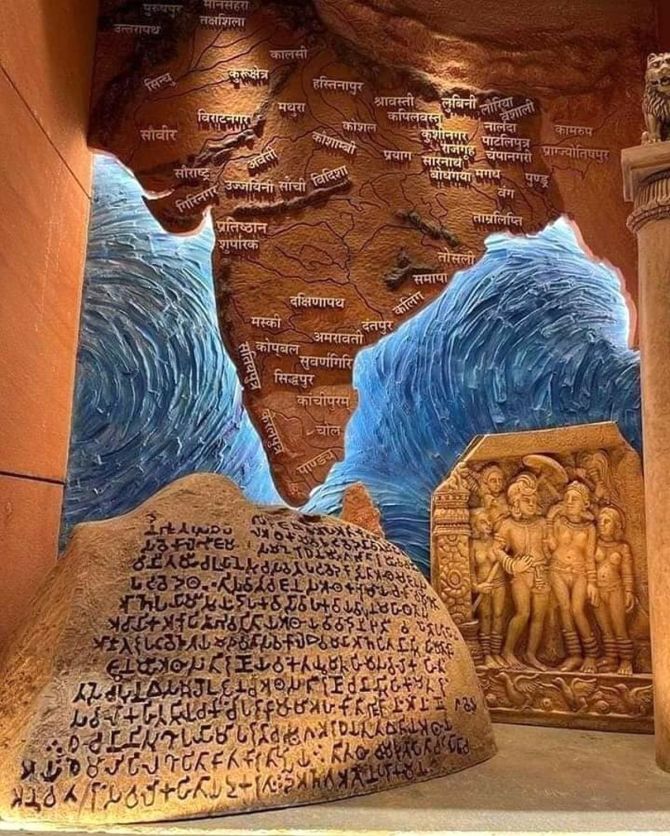
by Shaimin Raja 30 November 2023
A mural in the heart of India’s new parliament building has ignited a fierce debate across South Asia. This artwork, subtly alluding to the idea of Akhand Bharat, appears to depict a bygone era when most of the current South Asian states were part of a larger, undivided polity. However, the unveiling of this mural has not been met with enthusiasm; instead, it has sparked negative reactions from Pakistan, Nepal, and Bangladesh. These nations express concerns that the implied claims in the map threaten their hard-fought independence and sovereignty.
Historically, nations have often turned to civilizational arguments to legitimize present-day political claims, intertwining cultural narratives with territorial ambitions. India, too, is grappling with this intersection, prompting questions about whether its South Asia policy is undergoing a paradigm shift based on civilizational aspirations. The rise of the right-wing Bharatiya Janata Party (BJP) has been a critical factor in shaping this discourse, as it controls a majority government, providing a platform for articulating civilizational narratives. The core question then becomes: Does India’s foreign policy now reflect a Hindutva-driven agenda, especially in South Asia?
A March 2023 research article delves into India’s civilizational arguments in South Asia, examining the period since 2014 when the BJP rose to prominence. While the official level remains somewhat detached from overt endorsements of Hindutva, there’s a nuanced exploration of how cultural and religious elements increasingly find their way into India’s foreign policy narrative. The controversy surrounding the Akhand Bharat mural is a stark example of the tensions these civilizational claims can trigger among neighboring nations.
At the official level, India’s engagements with South Asian neighbors often follow established patterns, steering clear of overt Hindutva endorsements. Even with the current government’s emphasis on India’s exceptionalism through foreign policy, the focus tends to be on cultural and religious elements rather than contentious issues associated with the Hindu right. However, the Akhand Bharat concept, deeply rooted in the belief of a civilizational India encompassing modern South Asia, remains a powerful narrative for the Hindu Right. This narrative, championed by key ideologues, sees modern South Asia as a fracture resulting from different religions, culminating in the territorial disjunction of the 1947 Partition.
Despite the powerful imagery and occasional rhetoric, there’s a reluctance to frame Akhand Bharat into formal policy. The influential Rashtriya Swayamsevak Sangh (RSS), an ideological forebear of the BJP, presents it as a cultural concept rather than a political agenda. Territorial conflicts with neighboring nations persist but are not fueled by the desire to redraw borders in alignment with Akhand Bharat. The idea seems to serve more as domestic rhetoric aimed at the Hindu nationalist base and the Indian diaspora.
India has a history of using civilizational narratives as part of its foreign policy, adapting the notion of civilization across different political eras. While the rise of Hindutva aligns with the idea of a resurgent Hindu nation globally, Akhand Bharat remains a popular domestic narrative with limited signs of policy articulation at the regional or international level. India’s self-perception as a responsible power, committed to regional cooperation and without extra-territorial aspirations, contrasts with the narratives of civilizational claims in South Asia.
However, the official silence or indifference to these narratives doesn’t negate their significance. The conduct of foreign policy extends beyond official interactions to include public perception, press reactions, and diplomatic engagements. The Akhand Bharat controversy exemplifies how civilizational claims, even when not translating into official policy, can complicate relations with South Asian neighbors. The structural factor of geographical and power asymmetry plays a role, with India’s prominence raising anxieties among neighboring states. The objections voiced by these nations often serve domestic political agendas, standing as a symbol of resistance against India’s perceived cultural appropriation of the entire region.
The recent controversy surrounding the mural highlights the delicate balancing act India must perform. While the Minister of Parliamentary Affairs asserted “Resolve is clear – Akhand Bharat,” the Indian Ministry of External Affairs clarified that the mural showcased the past territorial landscape of the Iron Age Mauryan Empire, with no current territorial aspirations in South Asia. Nepal and Bangladesh promptly raised objections, underscoring the need for India to manage its civilizational rhetoric carefully.
Asymmetry in South Asia remains a critical factor, with India’s civilizational claims likely to impact relations due to the prevailing anti-Indian sentiment and the need for neighboring states to assert their exclusive identities. The objections from South Asian states might not alter their overall approach to India, but they reflect deep-rooted ideas of exclusive nationalism, contributing to conflicting perspectives and implications for India’s self-image.
In conclusion, while civilizational claims add complexity to India’s relations with its neighbors, pragmatism and shared interests continue to shape regional cooperation. India’s civilizational narratives may evoke occasional objections, but there’s little evidence that these reactions lead to substantial policy shifts. As India asserts its role as a responsible power, it must balance its civilizational rhetoric with the realities of regional diplomacy, ensuring that historical narratives do not overshadow shared goals and cooperation in South Asia.
